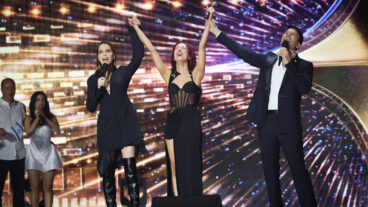Conductor Daniel Barenboim gives pointers to members of The West-Eastern Divan Orchestra. (Photo: AFP)Using the adage that music can soothe the savage beast, reknown conductor Daniel Barenboim is hoping that the orchestra he founded – The West-Eastern Divan Orchestra – will demonstrate that the shared language of classical music and love of Beethoven and Mozart can do its part to help overcome religious and political differences.
The orchestra in which young Israeli, Palestinian and Middle Eastern Arab musicians play side-by-side, gave a concert in the Moroccan capital of Rabat last week, its first performance in an Arab country.
The orchestra convenes annually at a summer workshop in the southern Spanish region of Andalusia. Among the 80 members of the orchestra were 6 Lebanese, 13 Egyptians, 6 Syrians, 31 Israelis, 4 Palestinian-Israelis, 19 Spaniards and 3 Jordanians. It is the fifth year that the workshop, founded by Barenboim, an Argentine-born Israeli citizen and Palestinian writer Edward Said, has been held and the second time it has been based in Andalusia – a symbolic venue because Muslims, Christians and Jews lived together for centuries in Moorish Andalusia before the Christian Reconquest of Spain in 1492 and the resultant expulsion of Jews.
“In spite of not being political, this is a workshop that shows that when the different peoples of the region unite to create something together, they have an extraordinary quality,” Barenboim told Reuters, speaking in an airy room in the former seminary of Pilas. “In that sense, it gives us an advance notice of what the Middle East might be.”
He acknowledges that music is not going to resolve the Middle East conflict. “But one thing is very clear: studying music is better than studying fundamentalism for both sides,” said Barenboim, 60, a distinguished pianist and music director of the Chicago Symphony Orchestra and the Deutsche Staatsoper Berlin.
Both Barenboim and Said say the reason for founding the orchestra was to help Arabs and Jews to see each other as human beings amid the violence in Israel and the Palestinian territories
Barenboim addresses his young musicians in a mixture of English, Hebrew, Spanish and German. Mina Zikri, 24, an Egyptian violinist, told Time magazine that the experience “humanizes the other party a bit”
He was sitting next to Ayelet Ballin, 24, a bassoonist from Tel Aviv. “Images can be very misleading,” Zikri told the British Guardian. “The suicide bomber brings to mind a certain image, so does the military operation. But these must not be fixed in one´s brain.”
Zikri has met Ballin at other music courses. “Now when I see her again I think, ´Here is my friend,´ not, ´Here is the Israeli person.”
Said described what he and Barenboim had put together as “one of the most important things I have done in my life. The orchestra is non- political and has no ulterior motive It doesn´t pretend to be building bridges. But there it is, a paradigm of coherent and intelligent people living together, ” he told The Guardian.
Barenboim and Said were honored last year with Spain’s highest peace award, the Prince of Asturias’s Concord prize, for their efforts to promote Middle East reconciliation.
After two weeks of intensive rehearsals in Pilas, the young musicians began a European tour, with dates at London?s Royal Albert Hall, Menton in France and three concerts in Germany. In a first this year, the orchestra performed in Rabat, Morocco, on August 24.
Standing in line to enter Rabat’s Mohammed V Theatre to hear the musicians, 34-year-old Finance Ministry official Jihane Bakkali told the BBC that the concert was “a great step forward for peace. It is a sign of tolerance, of people accepting one another”.
The concert of works by Beethoven and Mozart was attended by King Mohammed’s wife Princess Salma, the king’s sisters Princess Myriem and Princess Hassna, Prime Minister Driss Jettou and other members of the cabinet.
The chance to meet musicians from other cultures, as well as receiving coaching from Barenboim and a team of expert helpers, is valued by all of the young musicians who were chosen for the workshop in auditions held throughout the Middle East.
Matan Porat, a 21-year-old Israeli pianist and composer, said it was the first time he had met Arab musicians. “It?s very interesting to see that they have completely the same education and the same views…” he told Reuters.
Mohamed Saleh, a 27-year-old oboist from Egypt, said he felt very comfortable working with musicians from Israel and other countries. “We don’t care about the government or political problems or anything. We are just human and we want to live together and have fun,” he said.
“If we have like a million musicians together, that will be really very helpful” to bring peace to the Middle East, he said. The musicians said they rarely, if ever, discussed politics during their weeks together.
“I’m not used to talking (about) politics because I don?t like it,” said 31-year-old viola player Amir Zikri from Egypt.
Nabeel Abboud Ashkar, a 24-year-old Palestinian violinist who lives in Israel, said meeting Israelis was nothing new for him. “What is new for me is coming and meeting the Syrians and Lebanese,” he said.
“None of us here has any political problem with playing with each other, but we also in a way keep the political issue under the carpet a little bit.”
Barenboim says every musician who passed through the workshop had learned a lot. “In a way, this workshop has changed all of our lives – mine too. I’ve learned that there are many things that seem impossible and which in reality are very feasible,” he said












